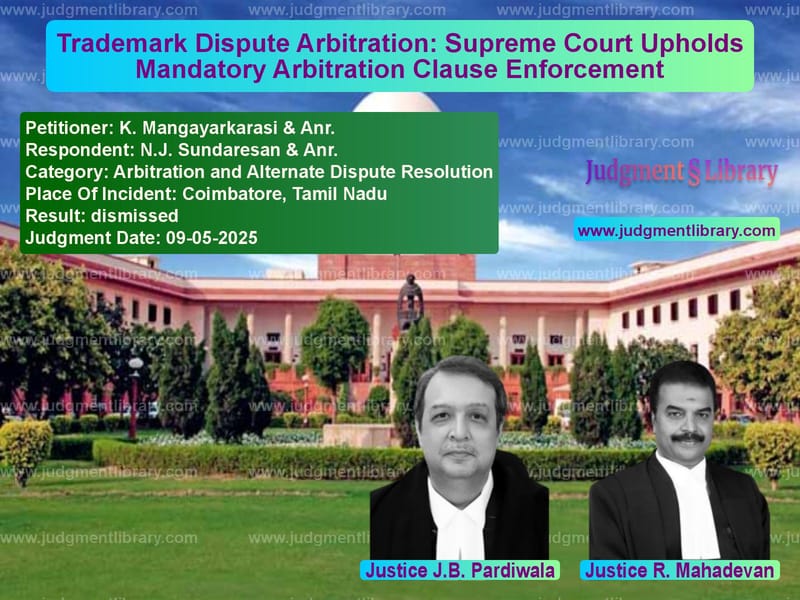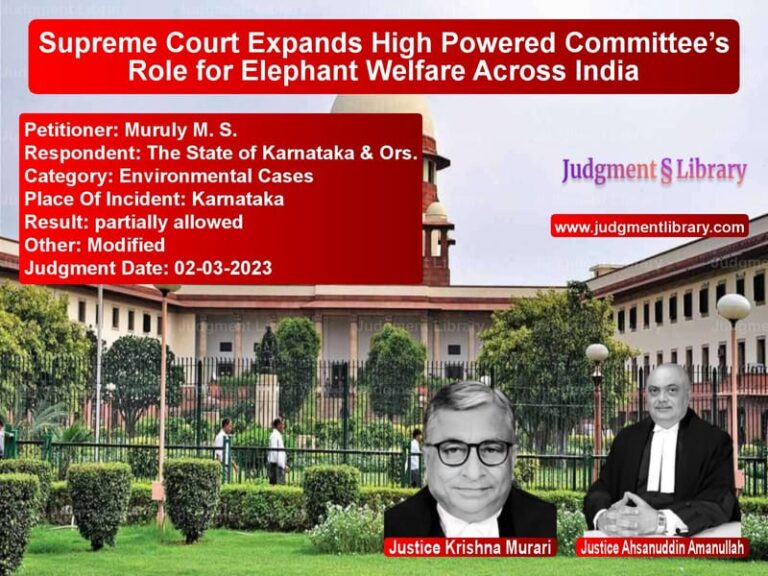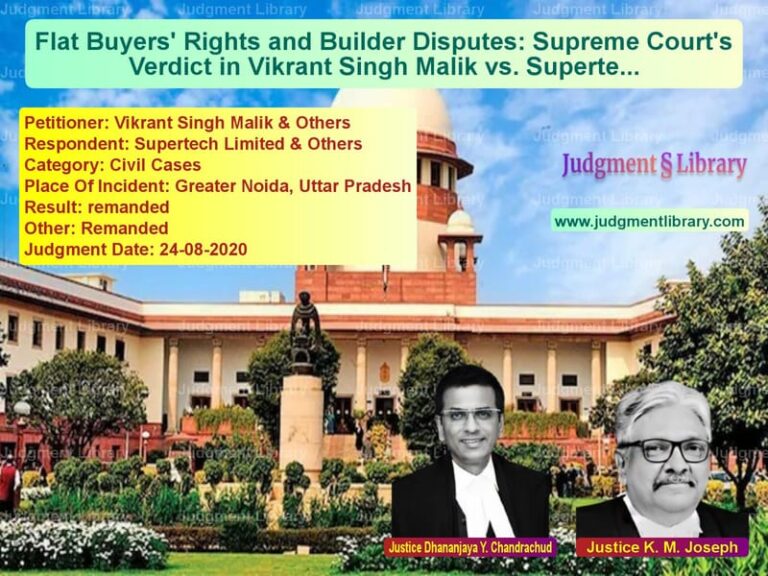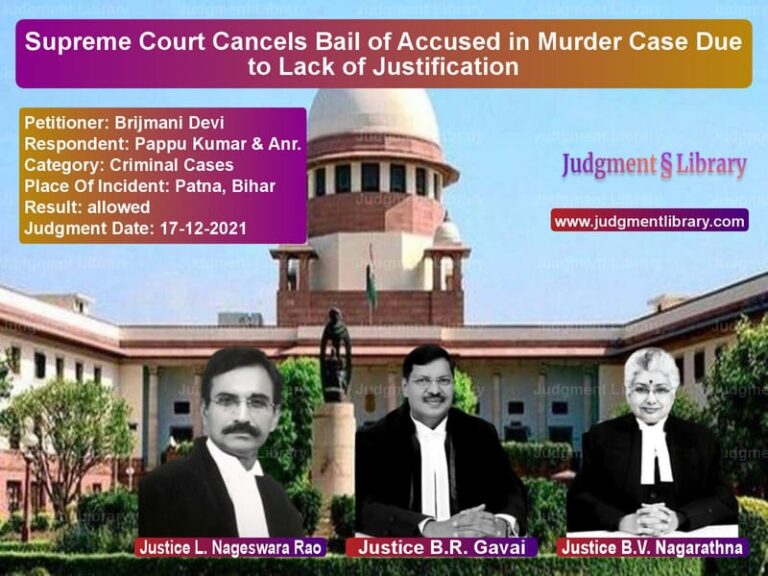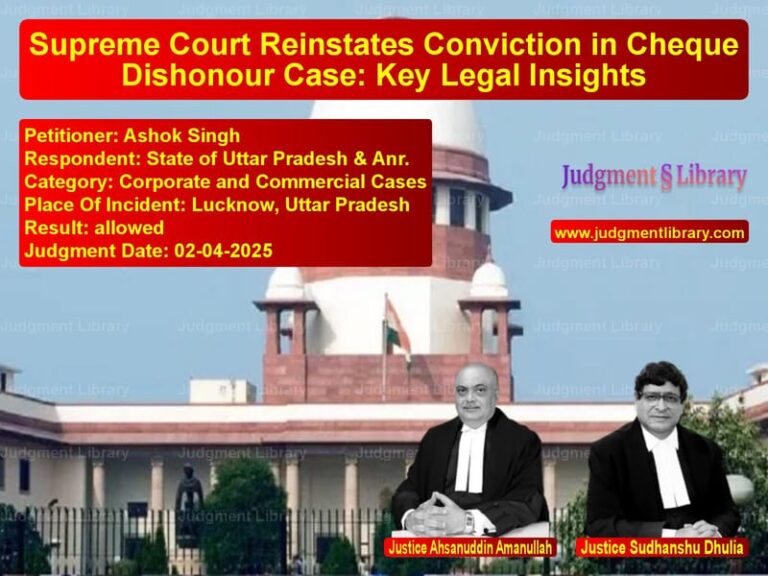Trademark Dispute Arbitration: Supreme Court Upholds Mandatory Arbitration Clause Enforcement
In a significant ruling that reinforces the binding nature of arbitration agreements in commercial disputes, the Supreme Court of India has dismissed a special leave petition challenging the referral of a trademark dispute to arbitration. The case of K. Mangayarkarasi & Anr. vs. N.J. Sundaresan & Anr. involved a family dispute over the famous “Sri Angannan Briyani Hotel” trademark, where the Court emphasized that parties cannot escape their contractual obligation to arbitrate disputes merely by alleging fraud or by filing civil suits.
The legal battle began when the petitioners, K. Mangayarkarasi and her daughter K.M. Shredevi, filed a suit in the Commercial Court at Coimbatore seeking permanent injunction to restrain the respondents from using the trademark “Sri Angannan Briyani Hotel” or any similar name, along with damages of Rs. 20,00,000. The suit alleged that the respondents were illegally using the trademark that rightfully belonged to the petitioners.
The Arbitration Agreement and Section 8 Application
The respondents, in response to the civil suit, filed an application under Section 8 of the Arbitration and Conciliation Act, 1996, seeking referral of the dispute to arbitration. They relied on two Deeds of Assignment of Trade Marks dated September 20, 2017 and October 14, 2019, both of which contained identical arbitration clauses. Clause 15 of these agreements stated: “In the event of any dispute, difference or claim arising between the Parties under or in connection with this Agreement, parties agree to get such issues and disputes resolved first through CONCILIATION failing which by ARBITRATION and in the event of not finding a resolution through arbitration, the Court having jurisdiction in Coimbatore to the exclusion of all other Courts.”
The petitioners resisted the Section 8 application by alleging that the assignment deeds were fraudulent. They claimed that the first petitioner had signed blank stamp papers that were later fabricated into assignment deeds, and that the respondent had fraudulently included his name in these documents.
The Commercial Court’s Decision
The Commercial Court allowed the Section 8 application and referred the parties to arbitration. The Court made several key observations in its order. It noted that “the suit is filed for the reliefs against infringement and passing off, which by their very nature would fall within the jurisdiction of the arbitrator.” The Court emphasized that “the right that is asserted by the petitioner is not a right that emanates from the Trademark Act, but a right that emanates from Ex.P1 and Ex.P2 Assignment deeds. The assignment of a trademark is by a contract and not by a statutory act.”
Regarding the allegation of fraud, the Commercial Court held that “it cannot be said that the disputes are not arbitrable” and that “no relief has been prayed for declaration to set aside the said Assignment deeds.” The Court also addressed the issue of non-signatory parties, noting that even though the third respondent was not a direct signatory to the assignment deeds, she could be subjected to arbitration proceedings as she derived rights through gift deeds and was sailing with the other respondents.
The High Court’s Affirmation
The petitioners challenged the Commercial Court’s order before the Madras High Court, which dismissed their civil revision petition. The High Court made several significant observations about the nature of the dispute and the arbitrability of trademark matters.
The High Court noted that “the suit has been filed by the Petitioners / Plaintiffs by suppressing the Arbitration Clause.” It emphasized that “when there is a valid contract between the parties providing for Arbitration, all claims including enforceability can only be adjudicated before an Arbitrator.”
On the crucial issue of fraud allegations, the High Court held that “the allegation of fraud must have some implication in public domain to oust jurisdiction of arbitration. If an allegation of fraud exists directly between the parties concerned, the same will not be termed to be of serious nature of fraud and hence would not be barred for arbitration.” The Court found that the dispute was essentially between private parties with no public cause involved.
The High Court also rejected the argument that trademark disputes are inherently non-arbitrable, observing that “the right that is asserted by the 1st Respondent is not a right that emanates from the Trademark Act, but a right that emanates from the Assignment Deeds. The Assignment of a trademark is by a contract and not by a statutory act.”
The Supreme Court’s Legal Analysis
The Supreme Court, in its order dismissing the special leave petition, provided a comprehensive analysis of the legal principles governing arbitration agreements and their enforcement. The Court began by citing its landmark decision in Kvaerner Cementation India Ltd. v. Bajranglal Agarwal and Anr. (2012), where it held that “the Arbitral Tribunal has the power to rule on its own jurisdiction even when any objection with respect to existence or validity of the arbitration agreement is raised.”
The Court extensively referred to its decision in A. Ayyasamy v. A. Paramasivam & Ors. (2016), which discussed the categories of disputes generally treated as non-arbitrable. These include: “(i) patent, trade marks and copyright; (ii) anti-trust/competition laws; (iii) insolvency/winding up; (iv) bribery/corruption; (v) fraud; (vi) criminal matters.” However, the Court clarified that “mere allegation of fraud by one party against the other would be sufficient to exclude the subject-matter of dispute from arbitration.”
The Court also relied on Booz Allen and Hamilton Inc. v. SBI Home Finance Limited & Ors. (2011), which discussed the concept of ‘arbitrability’ and distinguished between rights in rem and rights in personam. The Court held that “generally and traditionally all disputes relating to rights in personam are considered to be amenable to arbitration; and all disputes relating to rights in rem are required to be adjudicated by courts and public tribunals, being unsuited for private arbitration.” However, this is “not however a rigid or inflexible rule. Disputes relating to subordinate rights in personam arising from rights in rem have always been considered to be arbitrable.”
In Vidya Drolia v. Durga Trading Corporation (2021), the Court had clarified that while grant and registration of trademarks are sovereign functions with erga omnes effect, “the assumption that all matters relating to trademarks are outside the scope of arbitration is plainly erroneous.” The Court noted that “there may be disputes that may arise from subordinate rights such as licences granted by the proprietor of a registered trademark” and these are arbitrable as they relate to rights and obligations inter se the parties.
Fraud Allegations and Arbitration
The Supreme Court addressed the petitioners’ allegation of fraud in detail, referring to its recent decision in SBI General Insurance Co. Ltd. v. Krish Spinning (2024). The Court observed that “the aspect of full and final settlement having been obtained by fraud or coercion itself gives rise to an arbitrable issue and thus does not act as a bar to arbitration.”
The Court quoted from National Insurance Company Limited v. Boghara Polyfab Private Limited (2009), which held that “the mere execution of a full and final settlement receipt or a discharge voucher would not by itself operate as a bar to arbitration when the validity of such a receipt or voucher is challenged by the claimant on the ground of fraud, coercion or undue influence.”
The Court emphasized that “the law is well settled that allegations of fraud or criminal wrongdoing or of statutory violation would not detract from the jurisdiction of the arbitral tribunal to resolve a dispute arising out of a civil or contractual relationship on the basis of the jurisdiction conferred by the arbitration agreement.”
The Court’s Final Ruling
The Supreme Court laid down a crucial principle regarding the approach courts should take when faced with Section 8 applications: “Once an application in due compliance with Section 8 of the Act of 1996 is filed, the approach of the civil court should be not to see whether the court has jurisdiction. It should be to see whether its jurisdiction has been ousted.” The Court emphasized that “there is a lot of difference between the two approaches.”
The Court reinforced the principle that “once there is an arbitration agreement between the parties, a judicial authority before whom an action is brought covering the subject-matter of the arbitration agreement is under a positive obligation to refer parties to arbitration by enforcing the terms of the contract.” Significantly, the Court noted that “there is no element of discretion left in the court or judicial authority to obviate the legislative mandate of compelling parties to seek recourse to arbitration.”
The Court concluded that “in view of the foregoing, we are of the view that no error, not to speak of any error of law, could be said to have been committed by the High Court in passing the impugned judgment and order.” Accordingly, the special leave petition was dismissed.
Broader Implications
This judgment has significant implications for commercial disputes in India, particularly those involving intellectual property rights. It reinforces the pro-arbitration stance of Indian courts and emphasizes the sanctity of arbitration agreements voluntarily entered into by parties.
The ruling clarifies that not all trademark disputes are non-arbitrable. While disputes involving the grant or registration of trademarks (which are sovereign functions) may not be arbitrable, disputes arising from contractual arrangements like assignment deeds or license agreements are perfectly amenable to arbitration.
The judgment also establishes that allegations of fraud, unless they have implications in the public domain, do not automatically oust the jurisdiction of arbitral tribunals. This prevents parties from easily escaping their arbitration obligations by merely alleging fraud in their pleadings.
For businesses and legal practitioners, this ruling serves as an important reminder to carefully review contractual documents for arbitration clauses before initiating litigation. Once parties have agreed to arbitrate their disputes, courts will generally enforce such agreements, leaving it to the arbitral tribunal to decide on challenges to the validity of the underlying contract.
The Supreme Court’s decision ultimately promotes the efficiency of dispute resolution by ensuring that parties adhere to their chosen method of resolving disputes, thereby reducing the burden on already overburdened civil courts.
Petitioner Name: K. Mangayarkarasi & Anr..Respondent Name: N.J. Sundaresan & Anr..Judgment By: Justice J.B. Pardiwala, Justice R. Mahadevan.Place Of Incident: Coimbatore, Tamil Nadu.Judgment Date: 09-05-2025.Result: dismissed.
Don’t miss out on the full details! Download the complete judgment in PDF format below and gain valuable insights instantly!
Download Judgment: k.-mangayarkarasi-&-vs-n.j.-sundaresan-&-an-supreme-court-of-india-judgment-dated-09-05-2025.pdf
Directly Download Judgment: Directly download this Judgment
See all petitions in Arbitration Awards
See all petitions in Commercial Arbitration
See all petitions in Enforcement of Awards
See all petitions in Settlement Agreements
See all petitions in Judgment by J.B. Pardiwala
See all petitions in Judgment by R. Mahadevan
See all petitions in dismissed
See all petitions in supreme court of India judgments May 2025
See all petitions in 2025 judgments
See all posts in Arbitration and Alternate Dispute Resolution Category
See all allowed petitions in Arbitration and Alternate Dispute Resolution Category
See all Dismissed petitions in Arbitration and Alternate Dispute Resolution Category
See all partially allowed petitions in Arbitration and Alternate Dispute Resolution Category

